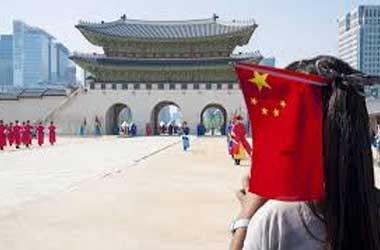China Eases Travel Restrictions To S. Korea And Its Foreigner Only Casinos


According to Korea Tourism Organization’s Deputy Director Park Yong-hwan and several Chinese travel agencies, the China National Tourism Administration has announced that the Chinese government is now allowing travel agencies to partly resume sales of group tours to South Korea.
Group tours to South Korea will once again be available from Beijing and Shandong, albeit with certain conditions and limitations. Only over-the-counter package tours are permitted—meaning no online offerings, chartered flights, or cruise trips.
Also included in the restrictions is the directive not to include any Lotte Group units. This includes a stop-over at Lotte Duty Free, a staple in prior tour packages to South Korea.
ARIRANG NEWS
This slow warming up of China to South Korea comes after the two countries reached an agreement at the end of October to put a stop to their almost year-long dispute. The agreement was confirmed after low-key negotiations between South Korean and Chinese officials settled the countries’ military and security prospects.
The South Korea-China rift dates back to March when South Korea agreed to the deployment of the US’ Terminal High Altitude Area Defense (Thaad) — an advanced American missile defense system that China has been fighting against for years. Lotte Group has been instrumental in the cold war between China and South Korea since it was the company who provided the land for the installation of the advanced anti-missile system.
In March, when the rift started, the international media reported that more than 3,400 Chinese tourists refused to leave their cruise ship when they arrived at Jeju Island in South Korea. The breakdown in relationship between the two countries significantly impacted tourism revenue in South Korea.
The Korea Tourism Organization reported that mainland Chinese tourist numbers fell 61.2 percent in August, 56.1 percent in September, and 49.6 percent in October. In the first nine months of the year, the decline in Chinese tourists cost South Korea $6.5 billion in revenue compared to last year’s data.
However the dip in Chinese tourists hasn’t had a major impact on the South Korean casino industry. Paradise Co Ltd, which operates a number of foreigner-only casinos and gaming properties in South Korea, reported a third quarter increase of 5.3 percent year-on-year.
Ironically, Paradise Co attributed their growth to the recovery in Chinese and Japanese VIP play. Grand Korea Leisure Co Ltd which is another foreigner only casino also said that their third quarter revenue had increased by 3.5 percent year-on- year.
Recent Posts
Marina Bay Sands Secures $9bn Loan for Casino Hotel Expansion
Summary: Las Vegas Sands secured a $9 billion loan for Marina Bay Sands' expansion in…
LV Sands, Concerned About Online Competition Amid Plan to Build $6bn Casino
Summary: Las Vegas Sands chairman and CEO Rob Goldstein is concerned about the impact of…
Biloxi Casino Plans Advance as MGC Considers Two Venues
Summary: Tullis Gardens Hotel and the Tivoli development are in the works. The casinos would…
Rio Hotel & Casino Finishes Phase One of Massive Property Renovation Project
Summary: Rio Hotel & Casino has completed phase one of its multi-year property-wide renovation project.…
Industry Heavyweight Execs Talk Tech Future at TribalNet Conference & Tradeshow
Summary: Monday’s TribalNet Conference & Tradeshow brought together gaming industry executives who discussed the future…
Nevada Regulators Propose Solution for Armed Casino Security Shortage
Summary: The Nevada Gaming Control Board addressed the shortage of armed casino security following the…
